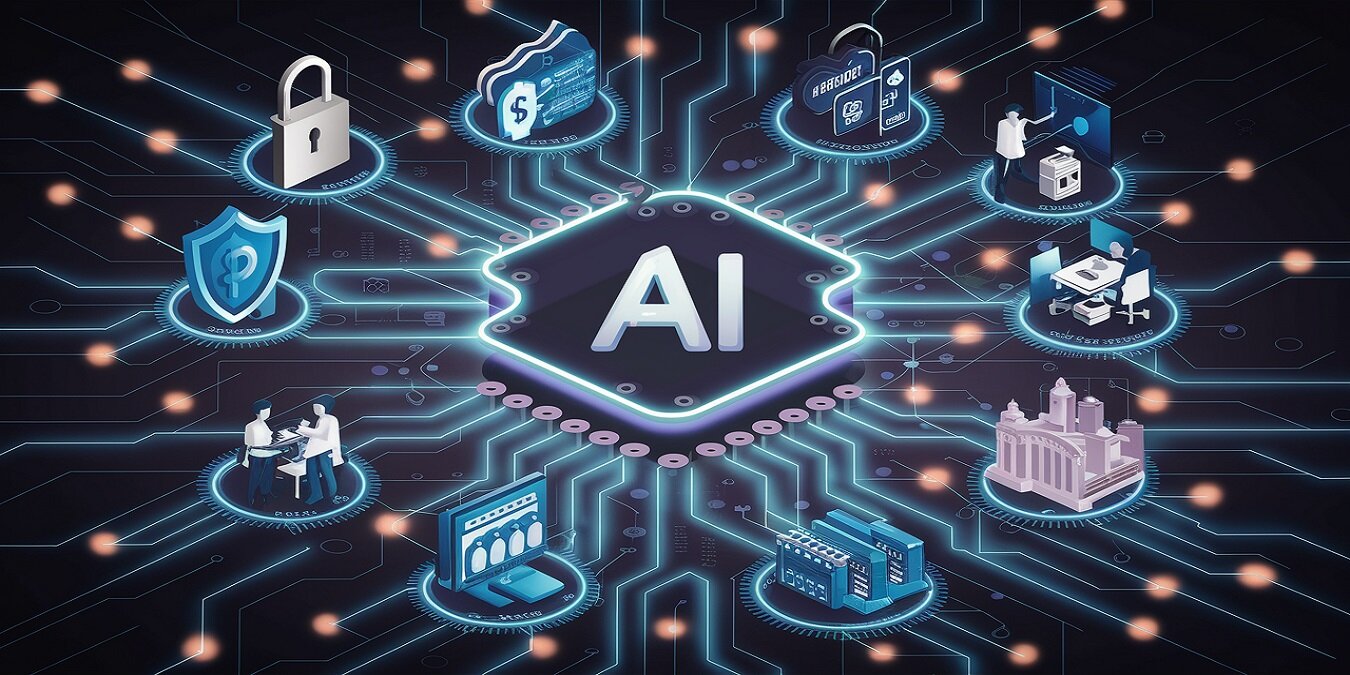
Artificial Intelligence in Trust-Building
In today’s digital age, trust has become a prized commodity. Whether between businesses and consumers, employers and employees or even governments and citizens, the ability to foster and maintain trust can often be the difference between success and failure.
Increasingly, Artificial Intelligence (AI) is playing a significant role in this trust-building process. By enhancing transparency, personalizing experiences, improving decision-making and ensuring security, AI offers myriad ways to build and sustain trust in various contexts. Let’s delve into how AI is transforming trust-building as we know it.
AI and Transparency
Transparency is a cornerstone of trust. People need to understand how decisions are made, especially when these decisions affect their lives. AI can help facilitate this transparency in several ways.
- Predictive Analytics
One of the key areas where AI is helping to build trust is in predictive analytics. By analyzing vast amounts of data, AI can provide insights and forecasts that are explainable and grounded in observable data patterns. For example, in the healthcare industry, AI-driven predictive models can help doctors predict patient outcomes based on historical data and shared medical records. When patients understand the basis for their diagnoses and treatments, they are more likely to trust their healthcare providers.
- Algorithmic Transparency
Another dimension of transparency is algorithmic transparency. Gone are the days when AI models were black boxes whose decisions could not be easily interpreted. Today, advanced techniques like explainable AI (XAI) aim to make the inner workings of AI models more understandable to humans. By offering explanations for their decisions, AI systems can foster greater trust among users. This is particularly crucial in sectors like finance or legal services, where stakeholders need to understand the reasoning behind AI-driven decisions.
- Open Data Initiatives
AI is also at the forefront of open data initiatives, where organizations make their data publicly accessible. By sharing data and related AI models, organizations demonstrate a commitment to transparency. This openness allows third parties to verify the accuracy of data and algorithms, further building trust. For example, many governmental organizations have begun releasing datasets that researchers or the public can use to verify claims and decisions made using AI.
Personalization and Trust
Personalization is another powerful means by which AI builds trust. By tailoring experiences to individual preferences and needs, AI can make interactions more relevant and engaging.
- Customer Service
In customer service, AI-driven chatbots and virtual assistants can provide personalized assistance that meets customer needs more accurately and swiftly than general-purpose systems. These AI systems can learn from past interactions to tailor future communications, thereby making customers feel heard and understood. As consumers see their individual preferences and histories respected, their trust in the brand or service provider grows.
- Content Recommendations
In the age of digital media, AI’s ability to personalize content recommendations is also vital for trust. Whether it is recommending movies, books, music or articles, AI systems develop an understanding of user preferences through analytics. By consistently providing relevant content, these systems build a trust relationship by proving that they understand and anticipate user needs.
- Healthcare and Personalized Medicine
In healthcare, AI is pushing the boundaries of personalization through innovations like personalized medicine. By considering a patient’s unique genetic makeup, lifestyle and medical history, AI can help design treatment plans tailored to individual needs. This personalization increases the efficacy of treatments and builds trust between patients and healthcare providers.
Homogenizing Decision-Making
AI’s role in standardizing and improving the quality of decision-making cannot be understated. By reducing human biases and errors, AI offers a more consistent, fair and rational basis for decisions, thus fostering trust.
- Bias Reduction
Human decision-making is often influenced by biases, whether conscious or subconscious. AI, when properly designed and programmed, can help mitigate these biases. For instance, in recruitment, AI algorithms can be used to screen resumes and identify the best candidates based on objective criteria, rather than on potentially biased human judgment. This can lead to a more diverse and equitable workplace, fostering trust in the fairness of the recruitment process.
- Data-Driven Insights
For business leaders, AI provides data-driven insights that support better decision-making. AI systems can analyze vast amounts of data much faster than any human can, identifying trends and patterns that might otherwise go unnoticed. These insights can inform strategic decisions, from market expansion to product development, helping businesses grow while establishing trust with shareholders and customers alike.
- Compliance and Ethics
AI can also be used to ensure compliance with regulations and ethical standards. For example, AI systems can monitor transactions for signs of fraud or other illicit activities, ensuring that organizations operate within legal and ethical boundaries. In doing so, they build trust with consumers, investors and regulators.
Security and Privacy
In an increasingly digital world, security and privacy are paramount. Breaches of personal data can erode trust quickly, whereas robust security measures and privacy protections can enhance it.
- Cybersecurity
AI a pivotal role in enhancing cybersecurity, which is a foundational aspect of trust in the digital age. Advanced AI systems can detect and respond to cyber threats in real-time, significantly reducing the risk of data breaches and other security incidents. These AI-driven security systems analyze patterns and anomalies in network traffic to identify potential threats before they can cause harm. By effectively safeguarding data, AI helps build trust among users who are increasingly concerned about the security of their personal information.
- Fraud Detection
In financial services, AI is revolutionizing fraud detection. AI systems can scrutinize transactions in real-time, identifying suspicious activity that may indicate fraud. These systems can continuously learn and adapt to new methods of fraud, making them highly effective at preventing fraudulent activities. When customers know that their financial institutions are using cutting-edge AI technologies to protect their assets, their trust in these institutions deepens.
- Privacy Preservation
Privacy is another critical area where AI contributes to trust. Techniques such as Differential Privacy ensure that AI models can learn from data without compromising the privacy of individuals. Federated Learning, another innovative approach, allows AI systems to train on data distributed across many devices without the data leaving those devices. These methods ensure that personal data remains secure and private, fostering trust among users who are wary of sharing their information.
AI in Human Resources and Workplace Trust
The workplace dynamics are also evolving with the advent of AI, significantly impacting how trust is built and maintained within organizations.
- Employee Engagement
AI-driven tools can help measure and boost employee engagement. By analyzing employee feedback, communication patterns and productivity metrics, AI can provide insights into employee morale and identify areas for improvement. Tools like sentiment analysis can gauge employee satisfaction and highlight potential issues before they escalate. When employees see that the organization is using data to improve their work experience, their trust in leadership can increase.
- Talent Management
AI can also enhance talent management processes such as recruitment, onboarding and training. By using AI to match candidates with roles that fit their skills and career aspirations, organizations can ensure a better fit and higher job satisfaction. AI-driven personalized learning and development programs can help employees grow their skills and advance their careers, further fostering a sense of trust and investment in the organization.
- Performance Management
Traditional performance reviews can be subjective and fraught with bias. AI can bring greater objectivity to performance management by analyzing objective performance data and providing unbiased feedback. Continuous, data-driven performance assessment helps employees understand how they are evaluated and what they can do to improve, leading to a fairer and more transparent work environment.
AI and Consumer Trust
Building and maintaining consumer trust is essential for any business. AI can play a critical role in enhancing consumer trust through improved customer experiences and robust data protection.
- Enhanced Customer Experiences
AI-powered customer service solutions, such as chatbots and virtual assistants, provide instant support and resolutions, significantly improving the customer experience. These AI systems can handle routine inquiries, freeing human agents to tackle more complex issues. By offering 24/7 support and resolving issues promptly, AI systems help build a reliable and trustworthy image for businesses.
- Product Recommendations and Personalization
AI’s ability to analyze customer data allows for highly personalized shopping experiences. By understanding consumer preferences and behaviors, AI can recommend products and content that are highly relevant to individual customers. This level of personalization makes consumers feel seen and valued, strengthening their trust in the brand.
- Data Security
Consumers are increasingly concerned about how their data is handled. AI-driven data security measures reassure consumers that their personal information is protected. Advanced encryption techniques, real-time threat detection and privacy-preserving technologies all contribute to creating a secure environment that builds consumer trust.
AI in Government and Public Trust
Governments are also leveraging AI to build trust with their citizens through improved services, transparency and security.
- Smart Cities
AI is at the heart of smart city initiatives, where data from various sources is used to improve urban living conditions. AI can optimize traffic flow, enhance public safety and manage utilities more efficiently. By providing better services and improving quality of life, AI-driven smart city projects can build public trust in government initiatives.
- Transparent Public Services
AI can make public services more transparent and efficient. For instance, AI systems can streamline administrative processes, reducing waiting times and making it easier for citizens to access services. Transparency in how services are rendered, coupled with efficiency, can enhance trust in public institutions.
- Election Security
Ensuring the integrity of elections is crucial for maintaining public trust in democratic processes. AI can be used to detect and prevent election fraud, from voter registration to vote counting. AI can also analyze social media and other digital platforms to identify and counteract misinformation campaigns, thereby safeguarding the electoral process.
Challenges and Ethical Considerations
While AI numerous benefits for trust-building, it is not without challenges and ethical considerations. Addressing these issues is crucial to ensuring that AI is used responsibly and maintains the trust it seeks to build.
- Bias and Fairness
One of the primary ethical considerations in AI is bias. If AI systems are trained on biased data or if the algorithms themselves are not carefully designed, they can perpetuate and even exacerbate existing biases. This can occur in various contexts, from hiring practices to law enforcement. Ensuring fairness in AI requires rigorous testing, ongoing monitoring and a commitment to using diverse and representative datasets. Biased systems can undermine trust, making it essential to address this issue proactively.
- Data Privacy
AI systems often require vast amounts of data to function effectively, raising significant privacy concerns. Without robust privacy protections, there is a risk that sensitive information could be exposed or misused. Ensuring that AI systems comply with privacy regulations such as GDPR (General Data Protection Regulation) and CCPA (California Consumer Privacy Act) is crucial. Additionally, implementing privacy-preserving techniques like anonymization and encryption can help protect individuals’ data and maintain their trust.
- Transparency and Accountability
While AI can enhance transparency, it can also introduce opacity if not managed correctly, especially with complex models like deep learning. Users need to understand how AI systems make decisions and who is accountable for those decisions. This requires developing explainable AI models and establishing clear lines of responsibility. When issues arise, there must be mechanisms in place to audit AI systems and address any concerns transparently.
- Security Risks
While AI enhances security in many ways, it also introduces new vulnerabilities. For example, AI systems themselves can become targets for cyber-attacks aiming to manipulate their outputs. Ensuring the robustness and security of AI systems is essential to maintain trust. This includes regular security assessments, implementing fail-safes and being vigilant about emerging threats.
- Ethical Use
The ethical use of AI goes beyond technical considerations to include questions about whether particular applications of AI are appropriate. For instance, the use of AI in surveillance raises significant ethical concerns about privacy and civil liberties. Engaging with diverse stakeholders, including ethicists, legal experts and the public, can help ensure that AI is used in ways that align with societal values and norms.
- Job Displacement
AI has the potential to automate tasks that were once performed by humans, leading to concerns about job displacement. While AI can create new opportunities, it can also disrupt labor markets. Ensuring that the workforce is prepared for such changes through education, training and reskilling programs can help ease these transitions and maintain trust in AI-driven economic transformations.
Success Stories and Case Studies
To illustrate the impact of AI on trust-building, let’s explore some real-world examples and case studies.
- Healthcare: IBM Watson
IBM Watson is a prime example of AI building trust in the healthcare sector. Watson uses AI to analyze vast amounts of medical data, helping doctors make more accurate diagnoses and treatment plans. The system’s ability to provide evidence-based recommendations has earned the trust of healthcare providers and patients alike. By enhancing transparency and personalizing care, Watson exemplifies how AI can build trust in critical areas like health.
- Finance: JPMorgan Chase’s Coin
JPMorgan Chase’s Coin (Contract Intelligence) uses AI to review and interpret commercial loan agreements. By automating this process, Coin can analyze thousands of documents in seconds, reducing errors and ensuring compliance. The transparency and efficiency provided by Coin have built trust with clients and regulators, showcasing the potential of AI in financial services.
- Retail: Amazon’s Personalized Recommendations
Amazon’s recommendation algorithms are a well-known application of AI in retail. By analyzing customers’ browsing and purchasing history, Amazon can provide highly personalized product recommendations. This personalization enhances the shopping experience, builds customer loyalty and fosters trust in the platform’s ability to understand and meet individual needs.
- Public Sector: Smart City Initiatives in Singapore
Singapore’s Smart Nation initiative leverages AI to improve urban living. AI systems are used for traffic management, energy efficiency, public safety and more. For example, AI-driven traffic lights reduce congestion by adapting to real-time traffic conditions. These initiatives enhance the efficiency and transparency of public services, building trust among citizens in the government’s ability to use technology for societal benefits.
The Future of AI and Trust
Looking ahead, the role of AI in trust-building is only set to expand. Several emerging trends and innovations will shape this future.
- Ethical AI Frameworks
As awareness of AI ethics grows, we can expect the development and adoption of more comprehensive ethical AI frameworks. These frameworks will guide the responsible use of AI, ensuring that systems are fair, transparent and accountable. By adhering to these standards, organizations can build and maintain trust with stakeholders, from customers to regulators.
- Explainable AI (XAI)
The continued advancement of Explainable AI (XAI) will be crucial for enhancing trust. As AI models become more complex, the need for interpretable and understandable decision-making processes will increase. XAI techniques that provide clear explanations for AI’s outputs will empower users to understand and trust the system’s recommendations.
- Federated Learning and Differential Privacy
Innovations in privacy-preserving AI techniques, such as Federated Learning and Differential Privacy, will be instrumental in building trust around data usage and protection. These methods allow AI systems to learn from distributed data sources without compromising individual privacy, addressing a key concern for many users and organizations.
- AI Governance and Oversight
As AI becomes more pervasive, the need for robust governance and oversight frameworks will grow. Policymakers, industry leaders and ethicists will collaborate to establish guidelines, standards and regulatory mechanisms to ensure the responsible development and deployment of AI. This will help build public trust in the technology and its applications.
- Human-AI Collaboration
The future of AI and trust-building will likely involve a greater emphasis on human-AI collaboration. Rather than viewing AI as a replacement for human expertise, organizations will increasingly leverage AI as a tool to augment and empower human decision-making. This symbiotic relationship can foster trust by demonstrating the complementary strengths of humans and machines.
- Trustworthy AI Certifications
To further build trust in AI systems, we may see the emergence of trustworthy AI certifications. These certifications would validate that an AI system meets specific standards for transparency, fairness, security and ethical alignment. Such certifications could become a trusted seal of approval, helping organizations and consumers identify AI solutions they can rely on.
Conclusion
In the digital age, trust has become a critical currency. Artificial Intelligence, with its ability to enhance transparency, personalize experiences, improve decision-making and ensure security, is playing a pivotal role in building and sustaining trust across various domains.
As AI continues to evolve, addressing ethical considerations and fostering responsible development will be crucial to maintaining public trust and realizing the full potential of this transformative technology.
By embracing the trust-building capabilities of AI, organizations and governments can forge stronger, more meaningful relationships with their stakeholders, whether they are customers, employees or citizens.
As we navigate the future, the strategic integration of AI into trust-building strategies will be a key differentiator for those seeking to thrive in an increasingly complex and interconnected world.















Truly a lot of fantastic material!